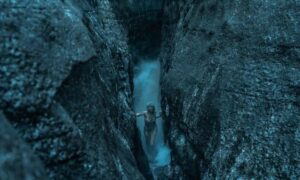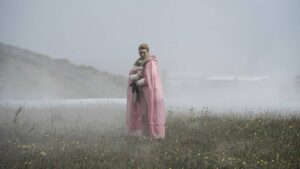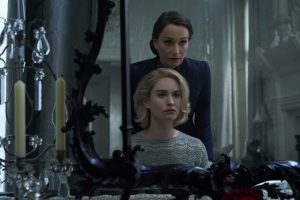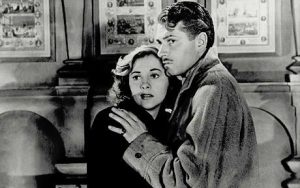The devastation left in the wake of a volcanic eruption is immeasurable: lives lost, entire civilizations wiped out, ecosystems and weather patterns thrown off-balance, lands left scarred by rivers of lava and falling ash. But over time, our miraculous planet always finds a way to rebuild. The lava cools and hardens into rock, the rocks are broken down into soil, plants take root again, animals return, humans follow, and the cycle continues: faster in some places than in others. Life doesn’t ever go back to the way it was, but it does come back eventually. And Netflix’s Katla takes that simple premise to an extreme only capable through science-fiction.

Katla, Netflix’s first original series produced in Iceland, is named for one of the island nation’s largest and most formidable volcanoes, which hasn’t erupted since 1918. Well, at least in real life. The Netflix series imagines a world where Katla awakens in the present day, forcing the citizens of the nearby village of Vík (also a real place) to flee. The few survivors who stick around, whether to monitor Katla or because they can’t bear to leave the only life they’ve ever known, are themselves hardening and/or breaking down, much like the cooling magma which surrounds them.
But a year after the eruption, as most of the world is too preoccupied with which way the wind will blow Katla’s ash-fall to worry about the people of Vík who stubbornly choose to live in its shadow, the looming mountain sends a new kind of devastation down its slopes and into the village – a quiet, intensely personal devastation that affects each individual differently, as they’re confronted by mysterious strangers who appear to have stumbled out of the volcano’s heart, covered in ash and without any memories of how they ended up that way. These strangers are people from Vík’s past: some are recreations of Katla’s casualties; a few are younger, seemingly happier doppelgangers of people still alive and unwell; one is a murderous child. All are united by a single purpose which is slowly and delicately unfolded over eight episodes.
For a town so depleted by the volcano and its aftereffects, Katla has a surprisingly large ensemble cast – and once the doppelgangers start arriving in droves, that cast quickly becomes so sprawling that it’s a miracle the series is able to maintain its sense of intimacy. The decision to refrain from exploring its most outlandish science-fiction concepts proves a wise one from a purely thematic standpoint because the sci-fi is ultimately only in service of Katla‘s plot, not the plot itself, although I’m sure that will disappoint some viewers who tuned in specifically for the supernatural elements. Similarly, the “cliffhanger” ending can be read as either a thematically satisfying conclusion to the entire story that acknowledges the cyclical nature of life, or an invitation for a second season that’s more akin to what most viewers probably thought they were in for, which is a larger-scale epic. I’d be down for that too.

Katla isn’t exactly small in scope as it is, however – certainly not when the series puts its entire location budget onscreen, with stunning shots of southern Icelandic scenery including Katla itself, the towering prongs of the Reynisdrangar sea stacks, and the stark silhouette of the Víkurkirkja. The show’s overwhelmingly bleak cinematography tries to further accentuate the natural beauty of the land and its encircling ocean, although I still felt neither was shot with the dignity they deserve and indeed command. I felt this again when the show finally takes us into the cavernous heart of Katla – yet never gives us a moment to marvel at the mountain’s very real and very beautiful cave system. You know that shot from literally every documentary about speleologists ever, where our human protagonist stands in the pinpoint light from their helmet, dwarfed by the scale of the caves illuminated around them? Yeah, that’s what I was missing.
In contrast, the town and its variety of interior locations are small, bleak, and untidy – reflecting the general malaise that has settled upon the survivors, reducing them to bleary-eyed, weather-beaten shadows of their former selves…former selves who, mind you, come wandering out of Katla looking youthful and radiant once they’ve scrubbed off the ash that coats their bodies. Guðrún Ýr Eyfjörð Jóhannesdóttir, who has a vibrant pop-music persona under the stage name GDRN, is here at her most mellow and understated, playing the central character Gríma – a first responder whose grief over losing her sister to the volcano is the impetus for much of what follows, although she has only a tangential connection to the first doppelganger who appears; a Swedish woman named Gunhild (Aliette Opheim) who was involved in an affair with Gríma’s father Þór (Ingvar Sigurdsson) twenty years earlier.
Gríma is an interesting character, albeit very guarded, but Opheim is phenomenal playing two sides of the same coin – the wide-eyed ethereal vagabond Gunhild who walks out of Katla under the assumption that it’s still 2001, and the rigid, world-weary, older version of Gunhild who is still alive and living in Sweden, and is both shocked and shaken to her core when she discovers that her younger self is back, stirring up memories of the traumatic events that shaped her. Although a couple of characters meet versions of themselves, Opheim and Sólveig Arnarsdóttir – playing the once effervescent Magnea, whose arc seems distanced from the rest until near the very end, where it becomes the highlight of the show’s finale – are the best at distinguishing these doppelgangers while subtly emphasizing their similarities to the versions we know in ways I found fascinating.

Again, this is a slow-burn, suspenseful, character drama – one which masterfully uses the building blocks of good sci-fi, but which never indulges in the sci-fi to the point where it overwhelms the story. If that sounds interesting to you, and you either understand Icelandic or simply don’t mind subtitles (I usually watch non-English media with subtitles, but pick a few scenes to test out the English voice-dub – Katla‘s is better than some, but not good enough to warrant missing out on the beautiful undulating sounds of spoken Icelandic, an endangered language that needs shows like this to remind people why it’s worth speaking), then this series will make an excellent addition to your Netflix watchlist.
Series Rating: 8.5/10







